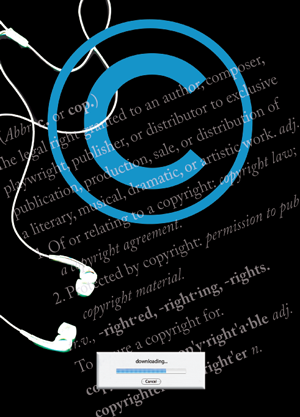Cornell warns students about online piracy
Caroline Luppescu '10 received a "scary" e-mail the spring of her freshman year. It was from the Recording Industry Association of America (RIAA), saying that it knew she had illegally downloaded 352 copyrighted songs, and that if she refused a flat settlement of $3,000, it would sue her for $750 per song—or $264,000. "I checked my iTunes for the number of illegally downloaded music files, and it was exactly 352," Luppescu says. "So I knew they meant business." She and her parents decided to settle.
Luppescu's experience is a footnote in the ongoing battle between universities and the movie, music, and software industries to control the information coursing through higher education networks. In their latest move, Cornell officials are requiring new students to watch a three-minute video that aims to help them avoid Luppescu's fate. The video, describing the risks of using peer-to-peer file-sharing programs on Cornell's network, was e-mailed this fall to new students and played during registration at Barton Hall. Next year, incoming Cornellians will see the video when they activate their Internet ID, says Tracy Mitrano, JD '95, Cornell's director of information technology policy. "We needed to tell them that higher education networks are targeted."

Students face a number of liabilities if they register a computer with peer-to-peer file-share programs (popular ones are LimeWire, eDonkey, and Bit Torrent), which can automatically transmit copyright-protected media to the Internet via the Cornell network. Content-industry groups like RIAA and the Motion Picture Association of America scan these peer-to-peer systems for potential copyright infringement and send notices to the campus network to "take down" the material when violations are found.
Last year, Cornell network users received about 500 legal notices from content providers; in the past three semesters, more than forty people were threatened with lawsuits. In another recent initiative, the University now requires those who receive a notice to take an online tutorial about laws, technologies, and liabilities of digital copyright. And in June, Cornell posted an online article, "Responsible Use of the Internet," as part of the information technology office's Family Guide to Computing at Cornell.
Despite these steps, Mitrano feels that the content industries are targeting universities for a problem that is more complex— and not isolated to universities. In August, Congress passed the Higher Education Opportunity Act, which requires schools that offer Internet services—and most do—to create a plan "to implement a technological solution" to peer-to-peer piracy. Among the approaches universities can take are technological devices that monitor traffic for content, Mitrano says. "Higher education in general, and research universities like Cornell in particular, are hesitant to take this kind of approach because of its potentially deleterious effect on network performance, as well as the possible chilling effect that monitoring could have on its mission."
 Representatives of the media industries say that such legislation simply helps prevent theft, and that universities must act as partners in that effort. The analogy that RIAA president Cary Sherman '68 often uses is plagiarism. "There isn't a student who isn't aware that if they get caught plagiarizing just a paragraph or two in a term paper there are going to be severe consequences," Sherman says. "Yet a university will often stand by, knowing full well that thousands of copyrighted songs are being illegally downloaded, and say nothing. In fact, the reason that they're making a big issue about plagiarism is because they're trying to teach moral values, academic integrity. Universities especially should be teaching integrity about other forms of intellectual property as well, because there's probably no more important source of intellectual capital in the country than our universities."
Representatives of the media industries say that such legislation simply helps prevent theft, and that universities must act as partners in that effort. The analogy that RIAA president Cary Sherman '68 often uses is plagiarism. "There isn't a student who isn't aware that if they get caught plagiarizing just a paragraph or two in a term paper there are going to be severe consequences," Sherman says. "Yet a university will often stand by, knowing full well that thousands of copyrighted songs are being illegally downloaded, and say nothing. In fact, the reason that they're making a big issue about plagiarism is because they're trying to teach moral values, academic integrity. Universities especially should be teaching integrity about other forms of intellectual property as well, because there's probably no more important source of intellectual capital in the country than our universities."
Mitrano agrees that universities are in a unique position to further the discussion about copyright infringement as producers and consumers of intellectual property. However, the discussion goes deeper than a simple issue of right and wrong, she says. "Higher education should take a leadership position educating the public about the economic, political, and cultural significance of digital copyright so that society can debate it further," Mitrano says.
When Luppescu was threatened with a hefty fine, she felt that the RIAA had unfairly singled her out. She admits that she illegally downloaded music—mostly classic rock—using LimeWire, she says, "like thousands of Cornell students do." But she inadvertently set up her program so that any other LimeWire user could upload files from her computer. It was the heavy traffic on her Cornell address that caught the RIAA's eye. "Basically I didn't beat the system enough," she says. "My friends had been savvy enough to set it so they had less of a chance of being caught. But I wasn't aware of how to do that, so I paid the price."
While the copyright debate continues, Luppescu has been buying songs through iTunes and stopped illegal downloading. "Are you kidding?" she says. "I'm never going to do that again."
— Susan Kelley


